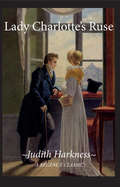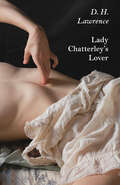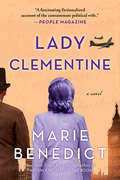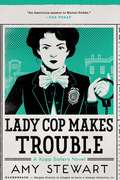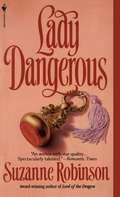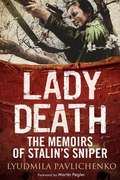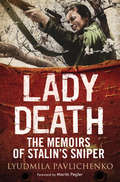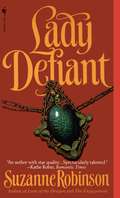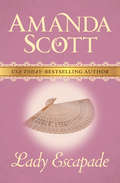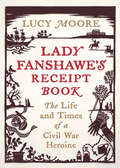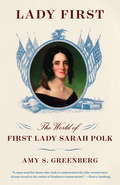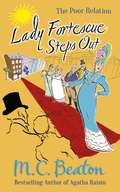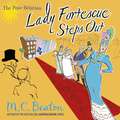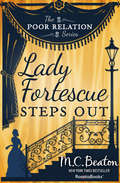- Table View
- List View
Lady Charlotte's Ruse
by Judith HarknessLady Charlotte is the happiest of young ladies as she awaits her beloved Gerald Kirkland, the dashing young man who is also, seemingly, devoted to her. Then, suddenly and without warning, Gerald disappears to far-off America in the company of the caddish Fitzwilliam Canterby, there to fall into the clutches of the lovely, dangerous Miss Chastity Brown. When Charlotte finds herself forced by her father into an engagement to the notorious Marquis of Beresford, who can promise her only a lifetime of cold courtesy and callous betrayal, she can bear it no longer.As her wedding day draws near, Charlotte realizes she is about to lose her one chance of happiness - unless she takes matters into her own hands, and even if it means behaving as no young lady should, and taking a gamble she cannot afford to lose.Fans of Jane Austen and Georgette Heyer will delight in the reissue of this classic Regency Romance by Judith Harkness. With a light touch and keen eye for human foibles, Harkness not only paints the fashionable world of Regency England, with its beaus and belles, balls and routs, but takes the reader on a fascinating tour of post-Revolutionary New York. There, on the majestic banks of the Hudson River, we are given a privileged view of how aristocratic Americans lived only a few decades after declaring their independence from the British. Brimming with period detail, Lady Charlotte's Ruse will delight readers craving a good, old-fashioned romantic caper.Judith Harkness is the author of five classic Regency Romances: The Montague Scandal, The Admiral's Daughter, The Determined Bachelor, Contrary Cousins, and Lady Charlotte's Ruse, all originally published by Signet. She is the co-author of a screenplay, EMMA in New York, an updated version of the classic Jane Austen novel set in contemporary Manhattan. As J.H. Richardson, she writes non-fiction on subjects ranging from children with learning and developmental issues to profiles of notable creative artists. She lives in Rhode Island with her husband, Will Taft.Finally! A really well written historical romance that can hold it's own with the likes "Emma" and "Pride and Prejudice." Can't wait to read more...--Sally Quinn, New York
Lady Chatterley's Lover: A novel (Vintage Classics)
by D. H. LawrenceSOON TO BE A MAJOR MOTION PICTURE STARRING THE CROWN&’S EMMA CORRIN AND UNBROKEN&’S JACK O&’CONNELLIntroduction by Kathryn Harrison Inspired by the long-standing affair between D. H. Lawrence&’s German wife and an Italian peasant, Lady Chatterley&’s Lover follows the intense passions of Constance Chatterley. Trapped in an unhappy marriage to an aristocratic mine owner whose war wounds have left him paralyzed and impotent, Constance enters into a liaison with the gamekeeper Mellors. Frank Kermode called the book D. H. Lawrence&’s &“great achievement,&” Anaïs Nin described it as &“his best novel,&” and Archibald MacLeish hailed it as &“one of the most important works of fiction of the century.&” Along with an incisive Introduction by Kathryn Harrison, this Modern Library edition includes the transcript of the judge&’s decision in the famous 1959 obscenity trial that allowed Lady Chatterley&’s Lover to be published in the United States.
Lady Claire Is All That: Keeping Up with the Cavendishes
by Maya RodaleIn the third installment of Maya Rodale’s captivating, witty series, a marquess finds his fair lady—but must figure out how to keep herHER BRAINS…Claire Cavendish is in search of a duke, but not for the usual reasons. The man she seeks is a mathematician; the man she unwittingly finds is Lord Fox: dynamic, athletic, and as bored by the equations Claire adores as she is by the social whirl upon which he thrives. As attractive as Fox is, he’s of no use to Claire . . . or is he?PLUS HIS BRAWN . . .Fox’s male pride has been bruised ever since his fiancée jilted him. One way to recover: win a bet that he can transform Lady Claire, Society’s roughest diamond, into its most prized jewel. But Claire has other ideas—shockingly steamy ones . . .EQUALS A STUDY IN SEDUCTION . . .By Claire’s calculations, Fox is the perfect man to satisfy her sensual curiosity. In Fox’s estimation, Claire is the perfect woman to prove his mastery of the ton. But the one thing neither of them counted on is love . . .
Lady Clementine: A Novel
by Marie BenedictFrom Marie Benedict, the New York Times bestselling author of The Only Woman in the Room! An incredible novel that focuses on one of the people who had the most influence during World War I and World War II: Clementine Churchill. In 1909, Clementine steps off a train with her new husband, Winston. An angry woman emerges from the crowd to attack, shoving him in the direction of an oncoming train. Just before he stumbles, Clementine grabs him by his suit jacket. This will not be the last time Clementine Churchill will save her husband. Lady Clementine is the ferocious story of the ambitious woman beside Winston Churchill, the story of a partner who did not flinch through the sweeping darkness of war, and who would not surrender either to expectations or to enemies.Also by Marie Benedict: The Only Woman in the Room The Other Einstein Carnegie's MaidPraise for Lady Clementine:"Benedict is a true master at weaving the threads of the past into a compelling story for today. Here is the fictionalized account of the person who was the unequivocal wind beneath Winston Churchill's wings — a woman whose impact on the world-shaper that was WW2 has been begging to be told. A remarkable story of remarkable woman."—Susan Meissner, bestselling author of The Last Year of the War"The atmospheric prose of Marie Benedict draws me in every single time. Lady Clementine's powerful and spirited story is both compelling and immersive. Benedict fully inhabits the measured and intelligent voice of Clementine Churchill. Entranced throughout, I discovered the secrets behind a familiar story I thought I knew. Deftly moving from the early nineteen hundreds through World War II, Benedict skillfully paints a vivid picture of the times and life of Clementine, the remarkable woman who was the steady force beside Winston Churchill." —Patti Callahan Henry, New York Times bestselling author of Becoming Mrs. Lewis "In her latest novel, Lady Clementine, Marie Benedict has gifted us all with another thoughtful and illuminating behind-the-scenes look at one of history's most unusual and extraordinary women. Benedict stuns readers with a glorious assortment of Clementine Churchill's most personal secrets: her scandalous childhood, her unexpected role as a social outsider, her maternal insecurities, and the daily struggles she faces to smooth her husband's political blunders and to keep up with his relentless demands for guidance and attention. With a historian's eye and a writer's heart, Benedict provides an unforgettable glimpse into the private world of a brilliant woman whose impact and influence on world events deserves to be acknowledged."—Lynda Cohen Loigman, USA TODAY author of The Two-Family House and The Wartime Sisters
Lady Codebreaker
by K.D. AldenFans of Kate Quinn and Kristina McMorris will love this gripping historical novel based on the true story of the woman who used her codebreaking skills to bring down Prohibition gangsters and WWII Nazis, and who ultimately helped found the present-day CIA. Grace Smith has never been one to conform to society&’s expectations. She flees small-town Indiana to seek adventure—and finds more than she bargained for when she&’s hired by an eccentric millionaire to learn codebreaking. Soon she&’s using those skills to help head the government&’s fledgling cryptanalysis unit. During Prohibition, Grace takes up the fight against rumrunners—not to mention Al Capone himself. And as the country careens from one Great War to another, it&’s Grace who must crack the secrets of foreign governments, catch spies, and derail saboteurs . . . before it&’s too late. With wry wit and sheer grit, she forges her own path as a codebreaker, wife, mother. She&’s spent a lifetime going up against powerful men and winning. But as war rages and the stakes grow impossibly high, Grace faces a truly impossible choice: her family or her country?
Lady Cop Makes Trouble (Kopp Sisters #2)
by Amy StewartIn 1915, lady cops were not expected to chase down fugitives on the streets of New York City. But Constance Kopp never did what anyone expected. <p><p> Constance and her sisters aren’t living the quiet life anymore. They’ve made headlines fighting back against a ruthless silk factory owner and his gang of thugs. After Sheriff Heath sees Constance in action, he appoints her as one of the nation’s first female deputies. But when a German-speaking con man threatens her position—and puts the honorable sheriff at risk for being thrown in his own jail—Constance will be forced to prove herself again. <p> Based on the Kopp sisters’ real-life adventures, Girl Waits with Gun introduced the sensational lives of Constance Kopp and her sisters to an army of enthusiastic readers. This second installment, also ripped from the headlines, takes us farther into the riveting story of a woman who defied expectations, forged her own path, and tackled crime along the way.
Lady Danger
by Sarah MckerriganDeirdre of Rivenloch is the eldest daughter of an ailing Scottish lord. The Borders in 1135 is a dangerous place to be and Deirdre was raised to be the son her father never had. She, along with her middle sister, Helena, is an accomplished swordswoman, capable of defending her father's estate, as well as the honour of her youngest sister, Muriel. But the Scots king, realising the importance of their position along the Borders, assigns their lands' protection to his best commander, Sir Pagan Cameliard, and declares that Pagan can take his pick of the Rivenloch sisters for his bride. Deirdre is outraged by the king's proclamation and to save her sisters from marrying a stranger she tricks him into choosing her. Pagan finds Deirdre's ability to stand up to him intriguing and soon the two form a sort of truce. When the English attempt to conquer their lands they disagree on how best to protect the castle. When the English manage to wound and capture Pagan, Deirdre is torn between defending her homeland or rescuing the man she loves.
Lady Dangerous (Ladies #5)
by Suzanne RobinsonDetermined to find out if Viscount Radcliffe is the man responsible for her brother's murder, Liza Elliot poses as a maid in the house of the notorious Viscount Radcliffe and finds herself falling for the cold-blooded aristocrat.From the Paperback edition.
Lady Death: The Memoirs of Stalin's Sniper
by Lyudmila Mykhailvna PavlichenkoLyudmila Pavlichenko was one of the most successful – and feared – female snipers of all time. When Hitler launched Operation Barbarossa in June 1941 she left her university studies to join the Red Army. Ignoring offers of positions as a nurse she became part of Soviet Russia’s elite group of female snipers. Within a year she had 309 confirmed kills, including 29 enemy sniper kills. Renowned as the scourge of German soldiers, she was regarded as a key heroic figure for the war effort and, in 1942, on Stalin’s personal orders, she travelled as part of a Soviet delegation to the West, fundraising in Canada, Great Britain and the USA. Dubbed ‘Lady Death’, she spoke out about gender equality in the Red Army and made the case for the USA to continue the fight against the Nazis in Europe. The folk singer Woody Guthrie wrote a song about her exploits – ‘Miss Pavlichenko’ – and she visited the White House, where she formed an unlikely but long-lasting friendship with Eleanor Roosevelt. In November 1942 she visited Coventry and accepted donations of £4,516 from Coventry workers to pay for three X-ray units for the Red Army. She also visited a Birmingham factory as part of her fundraising tour.
Lady Death: The Memoirs of Stalin's Sniper
by Lyudmila PavlichenkoThe memoir of Lyudmila Pavlichenko, the Russian woman who was WWII&’s most accomplished sniper—and a friend of Eleanor Roosevelt.In June 1941, when Hitler launched Operation Barbarossa, Lyudmila Pavlichenko left her university studies, ignored the offer of a position as a nurse, and became one of Soviet Russia&’s two thousand female snipers. Less than a year later, she had 309 recorded kills, including 29 enemy sniper kills. By the time she was withdrawn from active duty due to injury, she was regarded as a key heroic figure for the war effort.To continue serving the war effort, Pavlichenko spoke at rallies in Canada and the United States. She toured the White House with FDR, and the folk singer Woody Guthrie wrote a song, &“Miss Pavlichenko,&” about her exploits. An advocate for women&’s rights, she befriended Eleanor Roosevelt and toured England to raise money for the Red Army. Never returning to combat, Pavlichenko trained other snipers. After the war, she finished her education at Kiev University and began a career as a historian. Today, she remains a revered hero in Russia, where the 2015 film, Battle for Sevastopol, was made about her life.
Lady Defiant (Ladies #3)
by Suzanne RobinsonAlthough she is accustomed to men who judge her by her looks, Oriel Richmond is furious when she overhears the dark and roguish Blade Fitzstephen describing her in less than flattering terms. From the Paperback edition.
Lady Derring Takes a Lover: The Palace of Rogues (The Palace of Rogues)
by Julie Anne LongA mistress. A mountain of debt. A mysterious wreck of a building.Delilah Swanpoole, Countess of Derring, learns the hard way that her husband, “Dear Dull Derring,” is a lot more interesting—and perfidious—dead than alive. It’s a devil of an inheritance, but in the grand ruins of the one building Derring left her, are the seeds of her liberation. And she vows never again to place herself at the mercy of a man.But battle-hardened Captain Tristan Hardy is nothing if not merciless. When the charismatic naval hero tracks a notorious smuggler to a London boarding house known as the Rogue’s Palace, seducing the beautiful, blue-blooded proprietress to get his man seems like a small sacrifice.They both believe love is a myth. But a desire beyond reason threatens to destroy the armor around their hearts. Now a shattering decision looms: Will Tristan betray his own code of honor…or choose a love that might be the truest thing he’s ever known?
Lady Disaster
by Amanda MarielIl Marchese di Gulliver, Seth Mowbray, non ha una famiglia tutta sua. Quando non è in compagnia dei suoi cari amici, il Duca e la Duchessa di Selkirk, annega la sua solitudine indulgendo alle cose più malvagie che la vita ha da offrire. Lady Constantine Hartley non sembra voler seguire le regole della società. La pressione e le aspettative le hanno guastato tutto il divertimento, perché allora preoccuparsi? Durante quest’ultima Stagione ha deciso di ignorare le regole e divertirsi. Dopo un incontro casuale, Seth si ritrova affascinato dall’infernale Lady Constantine. Allo stesso modo, Constantine si ritrova affascinata dal Marchese. Due paria della società possono sfidare la sorte e conquistare il vero amore?
Lady Drusilla's Road to Ruin (Ladies in Disgrace #1085)
by Christine MerrillConsidered a spinster, Lady Drusilla Rudney has only one role in life: to chaperone her sister. So when her flighty sibling elopes, Dru knows she has to stop her! She employs the help of a traveling companion, who looks harmless enough....Former army captain John Hendricks is intrigued by this damsel in distress. Once embroiled with her in a mad dash across England, he discovers that Dru is no simpering woman. Her unconventional ways make him want to forget his gentlemanly conduct...and create a scandal all their own!
Lady Eleanor's Seventh Suitor (The Sutherlands #1)
by Anna BradleyTo protect her sister, a lady determined to marry for love must accept a devious suitor&’s dubious proposal in this Regency romance series debut. There have been six suitors so far, all vying for the attention—and generous dowry—of the beautiful, elusive Eleanor Sutherland. But what will it take to melt the heart of the so-called Lady Frost? Camden West is determined to find out for himself . . . and he has a secret weapon. Cam knows that Ellie&’s sister, Charlotte, harbors a scandalous secret—one that could bring ruin to the Sutherland name. If Ellie marries him, Cam promises to keep mum. But is she willing to sacrifice her own happiness for her sister&’s reputation? To Ellie&’s surprise, it becomes clear that Cam doesn&’t need her money, nor is he interested in her status. Soon, what begins as a sham engagement transforms into something deeper, and more passionate, than Ellie could have imagined. Is it possible that all Cam truly wanted was her? Or could he be hiding something else? Even for a lady in love, only the truth will do.
Lady Elinor's Wicked Adventures
by Lillian MarekLady Elinor is searching for treasure The intrepid Lady Elinor Tremaine is caught up in the Victorian fervor for exploring distant lands. Her travels throw her back in the company of an old friend-this time, far from the security of polite society. And uncovering the secrets of her own heartHarry de Vaux, Viscount Tunbury, has loved Lady Elinor for as long as he can remember- but his family's sordid background put her completely out of his reach. Prowling through Etruscan ruins in Italy with Elinor is exquisite torture. She is so close, and so forbidden. . .
Lady Emma's Dilemma
by Rhonda WoodwardRhonda Woodward brings "writing that shines" (All About Romance) to a Signet Regency Romance classic... AVAILABLE DIGITALLY FOR THE FIRST TIME A lady forgives...but can she forget? What a dreadful misfortune that Lady Emmaline Fallbrook's grand return to London is spoiled by a sighting of Jack Devreux. He was the cad who endangered her reputation one impetuous night thirteen years ago and abandoned her. She is over him certainly, so hang the man--and the memories! But for someone who doesn't deserve a second thought, why is he consuming Emma's every thought? Baron Devreux is outraged. The unforgettable beauty who humiliated him on the most important night of his life is back, but why? The answers come under moonlight, with the promise of a little mischief and the unraveling of a soul-wrenching misunderstanding that could save two hearts from making the same mistake again... Don't miss other Signet Regency Romances by Rhonda Woodward: Moonlight and Mischief, A Hint of Scandal, A Spinster's Luck, and The Wagered Heart.
Lady Escapade
by Amanda ScottNow that they've married, is the beautiful new Countess of Andover's husband too masterful?Diana Sterling, having fallen deeply in love with Simon Warrington, Earl of Andover, and now his countess, is no longer inclined to fulfill his every whim. Since Simon seems bent on changing her, she has rebelled. Known as "Lady Escapade," she vigorously resists Simon's attempts to curb her defiant behavior and heedless flirtations, widening the gap between them. So when she embarks on her most dangerous escapade yet, will Simon be able to save her . . . and their marriage?
Lady Eve's Indiscretion (Windham Series #7)
by Grace BurrowesUSA Today Bestseller!"Burrowes delivers red-hot chemistry with a masterful mix of playfulness and sensuality."—Publishers Weekly Starred ReviewLady Eve's Got The Perfect PlanPretty, petite Evie Windham has been more indiscreet than her parents, the Duke and Duchess of Moreland, suspect. Fearing that a wedding night would reveal her past, she's running out of excuses to dodge adoring swains. Lucas Denning, the newly titled Marquis of Deene, has reason of his own for avoiding marriage. So Evie and Deene strike a deal, each agreeing to be the other's decoy. At this rate, matrimony could be avoided indefinitely...until the two are caught in a steamy kiss that no one was supposed to see.Windham series:The Heir (Book 1)The Soldier (Book 2)The Virtuoso (Book 3)Lady Sophie's Christmas Wish (Book 4)Lady Maggie's Secret Scandal (Book 5)Lady Louisa's Christmas Knight (Book 6)Lady Eve's Indiscretion (Book 7)Lady Jenny's Christmas Portrait (Book 8)Praise for Lady Maggie's Secret Scandal:"A tantalizing, delectably sexy story that is one of the best yet from an author on the way to the top."—Library Journal Starred Review"A delight...strikingly unique characters with realistic emotions and exciting antics."—RT Book Reviews, 4 Stars"Captivating...historical romance at its finest and rife with mystery and intrigue."—Romance Fiction on Suite 101
Lady Fanshawe's Receipt Book: The Life and Times of a Civil War Heroine
by Lucy MooreIn the mid seventeenth century, England was divided by war and bloodshed. Torn apart by rival factions, father opposed son and brother met brother on the battlefield. But while civil war raged on cobbled streets and green fields, inside the home domestic life continued as it always had done. For Ann Fanshawe and her children it meant a life of insecurity and constant jeopardy as she and her husband, a Royalist diplomat, dedicated their lives to the restoration of the Stuart monarchy. In this uncertain world, Ann's 'receipt book' was a treasured and entirely feminine response to the upheavals of war. These books were a feature of women's lives during this period, when there were few doctors to be found, and were full of life-saving medical knowledge that had been gleaned from mothers and friends. Remarkably, Ann's morocco-bound book full of scraps of ink-stained paper has survived to this day.Using Ann's receipt book and the memoirs she wrote for her surviving son, Lucy Moore follows her through this turbulent time as she leaves home, marries, bears - and buries - children and seeks to hold her family together. Lady Fanshawe's Receipt Book brilliantly brings to life Ann's struggles and her joys, revealing how ordinary women across the country fought to protect their loved ones in the face of conflict.
Lady First: The World of First Lady Sarah Polk
by Amy S. GreenbergThe little-known story of remarkable First Lady Sarah Polk--a brilliant master of the art of high politics and a crucial but unrecognized figure in the history of American feminism.While the Woman's Rights convention was taking place at Seneca Falls in 1848, First Lady Sarah Childress Polk was wielding influence unprecedented for a woman in Washington, D.C. Yet, while history remembers the women of the convention, it has all but forgotten Sarah Polk. Now, in her riveting biography, Amy S. Greenberg brings Sarah's story into vivid focus. We see Sarah as the daughter of a frontiersman who raised her to discuss politics and business with men; we see the savvy and charm she brandished in order to help her brilliant but unlikeable husband, James K. Polk, ascend to the White House. We watch as she exercises truly extraordinary power as First Lady: quietly manipulating elected officials, shaping foreign policy, and directing a campaign in support of America's expansionist war against Mexico. And we meet many of the enslaved men and women whose difficult labor made Sarah's political success possible.Lady First also shines a light on Sarah's many layers and contradictions. While her marriage to James was one of equals, she firmly opposed the feminist movement's demands for what she perceived to be far-reaching equality. She banned dancing and hard liquor from the White House, but did more entertaining than any of her predecessors. During the Civil War, she operated on behalf of the Confederacy even though she claimed to be neutral. And in the late nineteenth-century, she became a celebrity among female Christian temperance reformers, while she struggled to redeem her husband's tarnished political legacy.Sarah Polk's life spanned nearly the entirety of the 19th-century. But her own legacy, which profoundly transformed the South, continues to endure. Comprehensive, nuanced, and brimming with invaluable insight, Lady First is a revelation of our eleventh First Lady's complex but essential part in American feminism.
Lady Folbroke's Delicious Deception (Ladies in Disgrace #1081)
by Christine MerrillEmily Longesley married the love of her life and hoped that he would learn to love her. Instead, he upped and left their country estate for London. Suffering the snub with dignity, three years on Emily has had enough!Confronting her errant husband, Emily sees that Adrian, Earl of Folbroke, has been robbed of his sight and doesn't know her at all! Emily longs for her husband's touch. If she plays his mistress by delicious deception, can he finally learn to love his wife?
Lady Fortescue Steps Out (The Poor Relation)
by M.C. BeatonThe first book in M.C. Beaton's charming Poor Relation series. What do you do if you are of noble stock, but impoverished, and living in London with a certain style to maintain? One has to work... but One's relatives will be appalled when One turns One's hand to trade - and opens a hotel, The Poor Relation, offering employment to others of the same social standing and in the same awkward situation. This is precisely what Mrs Fortescue decides upon and, together with friend Colonel Sandhurst, transforms her decrepit Bond Street home into a posh hotel, offering guests the pleasure of being waited upon by the nobility. So with the help of other down-and-out aristocrats they do just that - and London's newest, and most fashionable! - hotel is born... much to the dismay of the Duke of Rowcester, Lady Fortescue's nephew, who is convinced his aunt's foray into trade will denigrate the illustrious family name!'Romance fans are in for a treat' - Booklist'[M. C. Beaton] is the best of the Regency writers' - Kirkus Reviews
Lady Fortescue Steps Out (The Poor Relation)
by M.C. BeatonThe first book in M.C. Beaton's charming Poor Relation series. What do you do if you are of noble stock, but impoverished, and living in London with a certain style to maintain? One has to work... but One's relatives will be appalled when One turns One's hand to trade - and opens a hotel, The Poor Relation, offering employment to others of the same social standing and in the same awkward situation. This is precisely what Mrs Fortescue decides upon and, together with friend Colonel Sandhurst, transforms her decrepit Bond Street home into a posh hotel, offering guests the pleasure of being waited upon by the nobility. So with the help of other down-and-out aristocrats they do just that - and London's newest, and most fashionable! - hotel is born... much to the dismay of the Duke of Rowcester, Lady Fortescue's nephew, who is convinced his aunt's foray into trade will denigrate the illustrious family name!'Romance fans are in for a treat' - Booklist'[M. C. Beaton] is the best of the Regency writers' - Kirkus Reviews
Lady Fortescue Steps Out: A Novel Of Regency England - Being The First Volume Of The Poor Relation (The Poor Relation Series #1)
by M. C. BeatonAn impoverished widow opens a hotel serving the society she has fallen from in this regency romance featuring characters who &“leap off the pages&” (Publishers Weekly). After her husband&’s death, Lady Fortescue knows she must work, even though the thought will appal her society relatives. So she decides to transform her once-grand Bond Street home into a hotel, the Poor Relation, offering society guests the pleasure of being waited upon by nobility. With the help of other down-and-out aristocrats, London&’s newest, most fashionable hotel is born. And it is the perfect venue for Lady Fortescue to play with the love lives of her guests and staff, starting with her nephew, the dashing Duke of Rowcester. Lady Fortescue has it on good authority that the duke once shared a dance with darling Harriet James, the hotel cook. When the duke comes to London, Lady Fortescue orchestrates a reunion that is sure to scandalize the ton . . . New York Times bestseller M.C. Beaton, the pen name for regency author Marian Chesney, &“expertly sets the scene, recapturing the bawdiness and color of a long-ago time. . . . Hilarious and tragic; larceny, attempted murder, a satisfactory love affair and unlikely alliances make the hotel the liveliest spot in London&” (Publishers Weekly). &“A charming and humorous Regency.&” —Library Journal &“A solid cast of eccentrics.&” —Booklist
